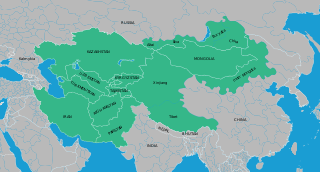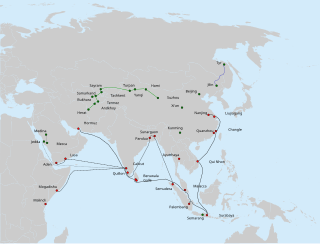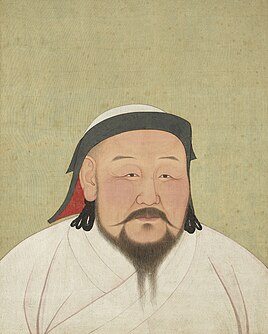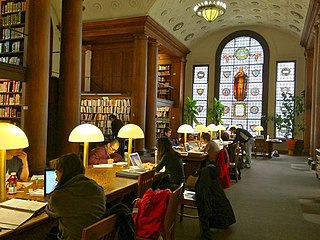Related Research Articles

Columbia University is a private Ivy League research university in New York City. Established in 1754 as King's College on the grounds of Trinity Church in Manhattan, Columbia is the oldest institution of higher education in New York and the fifth-oldest institution of higher learning in the United States. It is one of nine colonial colleges founded prior to the Declaration of Independence, seven of which belong to the Ivy League. Columbia is one of the most prestigious universities in the world.

Mongolia is a landlocked country in East Asia, bordered by Russia to the north and China to the south. It covers an area of 1,564,116 square kilometres, with a population of just 3.3 million, making it the world's most sparsely populated sovereign nation. Mongolia is the world's largest landlocked country that does not border a closed sea, and much of its area is covered by grassy steppe, with mountains to the north and west and the Gobi Desert to the south. Ulaanbaatar, the capital and largest city, is home to roughly half of the country's population.
This is a timeline of Mongolian history, comprising important legal and territorial changes and political events in Mongolia and its predecessor states. To read about the background to these events, see History of Mongolia. See also the list of presidents of Mongolia.

Inner Asia refers to the northern and landlocked regions spanning North, Central and East Asia. It includes parts of western and northeast China, as well as southern Siberia. The area overlaps with some definitions of 'Central Asia', mostly the historical ones, but certain regions that are often included in Inner Asia, such as Manchuria, are not a part of Central Asia by any of its definitions. Inner Asia may be regarded as the western and northern "frontier" of China proper of the former Qin dynasty and as being bounded by East Asia proper, which consists of China, Japan and Korea.
Ahmad Fanākatī or Banākatī was a Persian Muslim from the Qara Khitai who served as finance minister of the Yuan dynasty during Kublai's reign. He became known as a chief minister under Kublai and is credited with successfully establishing the financial system of the Yuan Empire. He was considered to be a "villainous minister" in dynastic histories because of his perceived corruption.

Rabban Bar Ṣawma, also known as Rabban Ṣawma or Rabban Çauma, was a Turkic Chinese monk turned diplomat of the "Nestorian" Church of the East in China. He is known for embarking on a pilgrimage from Yuan China to Jerusalem with one of his students, Rabban Markos. Due to military unrest along the way, they never reached their destination, but instead spent many years in Ilkhanate-controlled Baghdad.

The Catholic Church in Mongolia is part of the worldwide Catholic Church, under the spiritual leadership of the Pope in Rome. There are around 1,300 Catholics in the country who are served by three churches in the capital Ulaanbaatar plus churches in Darkhan, Arvaikheer, Erdenet and mission stations that may grow into churches.
Jamal ad-Din Muḥammad ibn Ṭāhir ibn Muḥammad al‐Zaydī al‐Bukhārī was a 13th-century Persian astronomer. Originally from Bukhara, he entered the service of Kublai Khan around the 1250s to set up an Islamic Astronomical Bureau in his new capital Beijing, to operate in parallel with the traditional Chinese bureau. Kublai Khan thus maintained the bureaucratic structure, but allowed Chinese observations and predictions to be checked by respected Muslim scholars.

Chen Cheng (1365–1457), courtesy name Zilu (子鲁), pseudonym Zhushan (竹山), was a Chinese diplomat known for his overland journeys into Central Asia during the Ming dynasty. His travels were contemporaneous to the treasure voyages of the admiral Zheng He.
Dashiin Byambasüren is a Mongolian politician who was Prime Minister of Mongolia from 11 September 1990 to 21 July 1992, the first one to be appointed by a democratically elected parliament, as a member of the Mongolian People's Revolutionary Party. He comes from a Buryat background. He is married with six children.

The Yuan dynasty, officially the Great Yuan, was a Mongol-led imperial dynasty of China and a successor state to the Mongol Empire after its division. It was established by Kublai, leader of the Borjigin clan, and lasted from 1271 to 1368. In orthodox Chinese historiography, the Yuan dynasty followed the Song dynasty and preceded the Ming dynasty.

Kublai, also known by his temple name as the Emperor Shizu of Yuan and his regnal name Setsen Khan, was the founder of the Yuan dynasty of China and the fifth khagan-emperor of the Mongol Empire from 1260 to 1294, although after the division of the empire this was a nominal position. He proclaimed the empire's dynastic name "Great Yuan" in 1271, and ruled Yuan China until his death in 1294.
Mawlānā Ghiyāth al-dīn Naqqāsh was an envoy of the Timurid ruler of Persia and Transoxania, Mirza Shahrukh, to the court of the Yongle Emperor of the Ming Dynasty of China, known for an important account he wrote of his embassy. His name has also been transcribed in English works as Ḡīāṯ-al-Dīn Naqqaš, Ghiyasu'd-Din Naqqash, Ghiyāthu'd-Dīn Naqqāsh, or Ghiyathuddin Naqqash.

The Ming–Turpan conflict were a series of conflicts between the Ming dynasty and Khanate of Turpan that erupted due to disputes over borders, trade and internal succession to the throne of Turpan.
Fu An was a Ming dynasty diplomat, who was dispatched in 1385 with two other officials and a eunuch named Liu Wei, to open communications with the nations of Central Asia. They traversed the desert of Gobi and reached Hami; thence on to Karakhoja and Ilbalik, the ancient capital of Kuldja. Their mission was successful as far as Samarkand, the various places visited acknowledging the suzerainty of China. There however they were imprisoned by Timur until 1407 as Timur attempted to attack the Ming dynasty. The survivors, including only 17 of their original escort of 1,500 men, were then sent back after Timur's death and were all rewarded on arrival. Fu An and his companions went on six missions altogether, chiefly to Samarkand, Beshbalik and Herat, until in 1415 Fu An retired to wait on his aged mother.
The Toluid Civil War was a war of succession fought between Kublai Khan and his younger brother, Ariq Böke, from 1260 to 1264. Möngke Khan died in 1259 with no declared successor, precipitating infighting between members of the Tolui family line for the title of Great Khan that escalated to a civil war. The Toluid Civil War, and the wars that followed it, weakened the authority of the Great Khan over the Mongol Empire and split the empire into autonomous khanates.

The Bureau of Buddhist and Tibetan Affairs, or Xuanzheng Yuan was a government agency of the Mongol-led Yuan dynasty of China to handle Buddhist affairs across the empire in addition to managing the territory of Tibet. It was originally set up by Kublai Khan in 1264 under the name Zongzhi Yuan or the "Bureau of General Regulation", before it was renamed in 1288.

Goryeo under Mongol rule refers to the rule of the Mongol Empire and the Mongol-led Yuan dynasty over the Korean Peninsula from about 1270 to 1356. After the Mongol invasions of Korea and the capitulation of the Korean Goryeo dynasty in the 13th century, Goryeo became a semi-autonomous vassal state and compulsory ally of the Yuan dynasty for about 80 years. It has been referred to as a "son-in-law kingdom in the Mongol empire." The ruling line of Goryeo, the House of Wang, was permitted to rule Korea as a vassal of the Yuan, which established the Zhengdong Province in Korea. Members of the Goryeo royal family were taken to Dadu, and typically married to spouses from the Yuan imperial house. As a result, princes who became monarchs of Goryeo during this period were effectively imperial sons in-law (khuregen). Yuan overlordship ended in the 1350s when the Yuan dynasty itself started to crumble and King Gongmin of Goryeo began to push the Yuan garrisons back.

The C.V. Starr East Asian Library is a library at Columbia University, holding collections for the study of East Asia in the United States. It is one of the largest East Asian libraries in North America, consisting of over one million volumes of Chinese, Japanese, Korean, Tibetan, Mongolian, Manchu, and Western-language materials, almost 7,500 periodical titles, and extensive special collections. It is located in Kent Hall, on the university's Morningside Heights campus.
Uriyangkhadai was an Uriankhai general in the Mongol Empire who led several campaigns during the 13th century Mongol conquest of the Song dynasty, including the first Mongol invasion of Vietnam. He was the son of military strategist Subutai and father of Mongol general and chancellor Aju.
References
- 1 2 3 "Morris Rossabi". columbia.edu. Retrieved February 27, 2022.
- 1 2 3 "Morris Rossabi". Max Planck Institute for the History of Science. Retrieved February 27, 2022.
- ↑ "Morris Rossabi". columbia.edu. Archived from the original on December 1, 2016. Retrieved November 30, 2016.
- ↑ "Rossabi, Morris". worldcat.org. Retrieved November 30, 2016.
- ↑ "Morris Rossabi". cuny.edu. Archived from the original on March 11, 2018. Retrieved November 30, 2016.